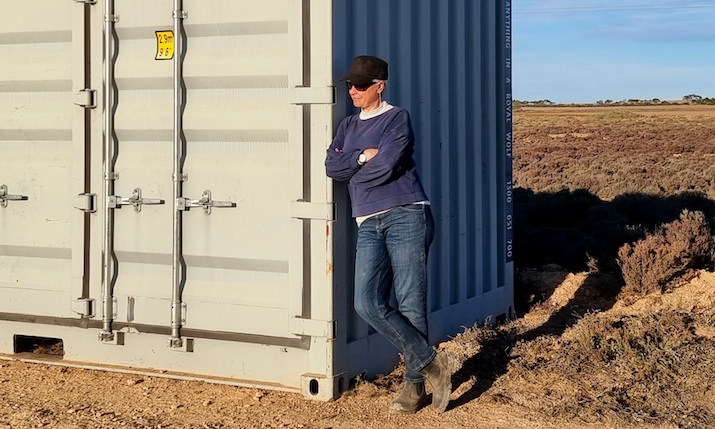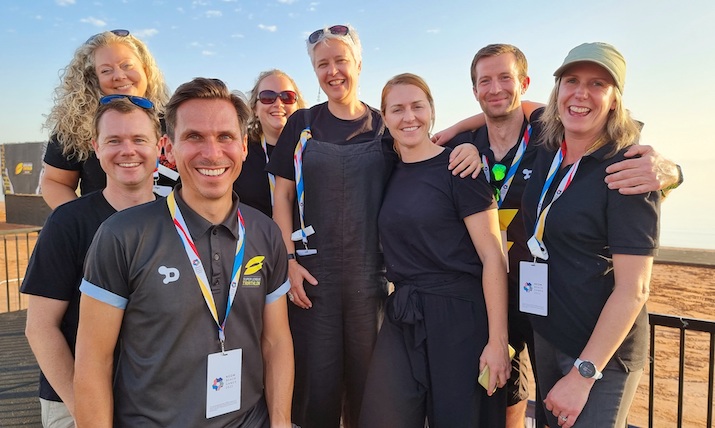Blue Peter badge: Aurora senior producer Laura Watts on pursuing crazy ambitions

Watts: ‘I can’t imagine doing anything else’
By Laura Watts, senior producer, Aurora
The first piece of truly valuable industry advice I received came from the Blue Peter editor, Lewis Bronze. I didn’t know anyone in the industry, but I grew up watching Blue Peter and wrote him a letter telling him I’d like to be a Blue Peter presenter. I’m sure he received many letters like mine, but even so, I received a reply. In a nutshell, he told me I’d need acting or journalism experience but should also consider joining the BBC on the production side. I still have the letter, which closes with: “I hope this will prove to be of some use to you”. It was.
Starting line
I started volunteering at a local radio station to help me secure a place on the postgraduate diploma in broadcast journalism in Falmouth. I was never a news junkie, but I loved sport. I’d fallen in love with Welsh rugby in my years at Cardiff University and returned to Wales after the postgrad to work as the sports reporter at Red Dragon FM. Reporting on the Welsh rugby team at the 5 Nations Championship in the mid-90s is – and always will be – a career highlight.
Natural career progression took me to BBC Wales Sport after a couple of years, still as a radio reporter and tasked with developing ‘minority sports’ (anything that wasn’t rugby or football, including athletics). That paid off and I joined the BBC Nations and Regions team at my first major event, the 1998 Commonwealth Games in Kuala Lumpur. I’ll never forget the day I was told I was going, nor will I forget the sound of the call to prayer waking me up with a start every morning in Kuala Lumpur. That was my first of seven Commonwealth Games; I haven’t missed one since.

Watts and the team ‘who all support me whenever we board the runaway train that is live TV’
After the Games, opportunities at Radio Wales dwindled but the new digital TV channels launched and, eight years after writing to Lewis Bronze, I was presenting on TV. By now, I really wanted to go to an Olympic Games. That wasn’t going to happen at BBC Wales because I didn’t speak Welsh, and it wasn’t going to happen for me as a presenter. (I’m a much better producer!). So, I applied for an attachment as an assistant producer at BBC Sport in London, where a handful of people helped me fly.
I’ve had so many opportunities: from directing live athletics events to filming features across the world and, of course, the big one, the Olympic Games. Athens 2004 was my first Olympics, sitting in a truck running in track replays. The Paralympics that year was more memorable; it’s the only accreditation I’ve kept from the many events I’ve had the privilege of attending. It was the first time I worked with Clare Balding, a horse died at the dressage (which still makes me sad) and there was an earthquake.
Seismic shift
There was another seismic shift when BBC Sport announced it was moving to Salford. I made the decision to stay ‘down south’ and embarked upon a varied freelance career: directing athletics at multiple World Championship and Commonwealth Games; presentation producer at Formula E; and deputy series editor on MotoGP.
Navigating live pit lanes and taking mini-breaks and photographs with Suzi Perry in amazing places (including hang-gliding over Rio) are in the cherished memories box. But being away from home doesn’t suit everyone, there’s a price to pay for it, especially when there’s a pandemic and you’re separated from your global network of friends and all your work goes away.
I accepted an offer to become a senior producer with Aurora a year ago. It was a difficult transition from freelance status to staff, but I felt like I’d plateaued as a freelancer and wanted to fulfil my potential before I retire (or die!).
“I didn’t take the easy route being an English female operating in Welsh sport. It’s definitely been character building. I’m not sure even Lewis Bronze could have foreseen all that’s happened”
The role is varied from live gallery producer to documentary maker and includes series, producing Super League Triathlon (SLT). We have an amazing team of people on SLT: powerhouse production manager Moira Comfort; PA extraordinaire Lisa Galliers; super-producer Kate Andrews; skilful camera supervisor Emma Moate; phenomenal floor manager Caroline Cox; all-seeing director of production Lara Bishop; and some equally talented men (but it’s International Women’s Day), who all support me whenever we board the runaway train that is live TV.
Last year I was invited to become a juror for Bafta, which is up there with walking through the doors of Broadcasting House for the first time a lifetime ago.
30 years in the game
I mark my 30th year in broadcasting this year. It hasn’t been without its challenges; I didn’t take the easy route being an English female operating in Welsh sport. It’s definitely been character building. I’m not sure even Lewis Bronze could have foreseen all that’s happened.
What advice would I give to someone considering a career in sports broadcasting? The list is long. Ultimately, will you regret it more if you do, or more if you don’t? I was lucky enough to be connected to my mentor, Helen Kuttner, over 20 years ago. She continues to listen, counsel, encourage and support. You definitely need someone like her on your side if you’re going to play this game.
And reach out to people already doing it. Maybe someone like Lewis Bronze who’s prepared to give advice to strangers with crazy ambitions. I didn’t ever write back and thank him, but maybe someone will see this and pass on my gratitude. I can’t imagine doing anything else.
